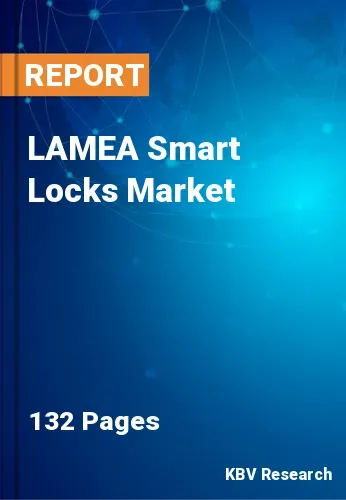The Latin America, Middle East and Africa Smart Locks Market would witness market growth of 17.2% CAGR during the forecast period (2023-2030). In the year 2026, the LAMEA market's volume is expected to surge to 1,764.2 thousand units, showcasing a growth of 18.7% (2023-2030).
Schools and universities are deploying these locks to bolster campus security and streamline access control. With programmable access permissions, educational institutions can efficiently manage entry to classrooms, offices, and dormitories. The ability to issue temporary digital keys for specific timeframes enhances the overall safety of students and faculty. The transportation industry is exploring the use of these locks in fleet management. With the integration of GPS technology and remote monitoring capabilities, these locks enhance the security of vehicles and cargo. Digital access controls also facilitate efficient vehicle access management, ensuring only authorized personnel can interact with the transportation assets.
These locks are vital in enabling aging individuals to live independently and securely. With features such as remote monitoring and the ability to grant access to caregivers, family members, or emergency services, these locks contribute to aging-in-place solutions that prioritize safety and autonomy. The locks are gaining popularity in multi-family residential complexes for managing access to common areas, gyms, and shared facilities. The ability to issue digital keys to residents and service providers simplifies access control for property management, enhancing overall security and convenience.
Urbanization is rising in South Africa, leading to higher city population density. The demand for secure access control systems, such as smart locks, increases in urban areas where residents seek technologically advanced solutions for their homes and businesses in South Africa. Furthermore, with an increase in urban crime rates, residents in Saudi Arabia are more inclined to invest in technologies that enhance home security. Due to these aspects, the market will expand across the LAMEA region in upcoming years.
The Brazil market dominated the LAMEA Smart Locks Market by Country in 2022, and would continue to be a dominant market till 2030; thereby, achieving a market value of $118.2 Million by 2030. The Argentina market is showcasing a CAGR of 17.8% during (2023 - 2030). Additionally, The UAE market would register a CAGR of 16.9% during (2023 - 2030).
Based on Technology, the market is segmented into Wi-Fi and Bluetooth. Based on Product, the market is segmented into Deadbolts, Lever Handles, Padlocks and Others. Based on End User, the market is segmented into Commercial and Residential. Based on countries, the market is segmented into Brazil, Argentina, UAE, Saudi Arabia, South Africa, Nigeria, and Rest of LAMEA.
Free Valuable Insights: The Worldwide Smart Locks Market is Projected to reach USD 6.4 Billion by 2030, at a CAGR of 15.2%
The market research report covers the analysis of key stake holders of the market. Key companies profiled in the report include Honeywell International, Inc., Zhejiang Dahua Technology Co., Ltd., Samsung Electronics Co., Ltd. (Samsung Group), Assa Abloy AB, Unikey Technologies Inc., Vivint Smart Home, Inc. (NRG Energy, Inc.), Allegion Plc, HavenLock Inc. and Salto Systems, S.L.
By Technology (Volume, Thousand Units, USD Billion, 2019-2030)
By Product (Volume, Thousand Units, USD Billion, 2019-2030)
By End User (Volume, Thousand Units, USD Billion, 2019-2030)
By Country (Volume, Thousand Units, USD Billion, 2019-2030)

Our team of dedicated experts can provide you with attractive expansion opportunities for your business.

